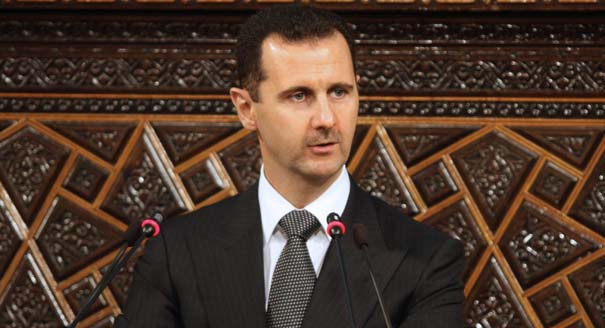On Thursday July 171, Bashar al-Assad will begin his third term as Syria’s president with an inauguration speech laying out his plans for the 2014–2021 period. The Syrian ruler has kept a low profile since the June 3 reelection, giving few hints about what course he will take. Some of his supporters have hinted that there could now be new reforms and a more inclusive government, but if past performance is anything to go by, don’t hold your breath.
The Al-Akhbar Interview
A week after the election, the regime-friendly, Beirut-based newspaper al-Akhbar published an exclusive interview with Assad by the Lebanese journalist Sami Kleib, who allowed the president to hold forth without objection or interrogation.
Recent gains have emboldened the regime, and Assad has everything to gain by offering disillusioned dissidents, outgunned rebels, and regretful defectors an honorable way to reintegrate with the regime. Indeed, a main theme of the president’s pontifications in al-Akhbar was that Syria should now aim for “dialogue and the culture of dialogue.” He lauded the idea of intra-Syrian dialogue as opposed to international negotiations of the type held in Geneva this spring. He insisted that the agreement to evacuate opposition fighters from Homs in May this year was born out of talks between locals on both sides:
They know each other. They are neighbors. That's why the reconciliation succeeded and the state treated the armed men with great respect, despite the wounds and the blood and the hatred, and it allowed them to leave after they surrendered their weapons and to use phones and to live a normal life.
This, of course, leaves out a rather significant part of the background: that the Syrian army had destroyed several pro-opposition neighborhoods in Homs and subjected the main holdout enclave to systematic starvation. To secure local ceasefires on government terms, that method is very effective, but it is hardly a strategy for national reconciliation.
Opposition Figures Joining The Government?
In his al-Akhbar interview, Assad didn’t touch upon the issue of political reform, but pro-regime figures have insinuated that the president is preparing a political opening that would include the ‘national opposition’ in a new government.
There have been rumors that Sheikh Ahmad Moaz al-Khatib, a pragmatic and widely respected Islamist exile, would be offered a role. That would be a surprising step forward from today’s complete deadlock, when even the most basic conditions for agreement seem absent. A ministerial post for any major opposition figure seems far-fetched and would be more likely to demolish the credibility of the appointee than to bring about any form of reconciliation.
The phrase ‘national opposition’ is otherwise often used by the regime to designate certain small, non-violent factions based in Syria, as opposed to the foreign-based and foreign-backed exile coalitions or armed rebels. Some of these so-called ‘national opposition’ groups are intelligence service playthings, like the leftist faction of former deputy prime minister Qadri Jamil, but others have a more serious claim to the opposition title.
The most important such group is the National Coordination Body for Democratic Change, or NCB, which is Syria’s largest alliance of non-violent and anti-interventionist dissidents. Assad’s more militant opponents often accuse the reformist and secularist NCB of serving as a fig leaf for repression, or even of active collaboration, but the group contains some high-profile opposition veterans. Though it has little influence over the rebellion, including NCB leaders in the government would be a first for Assad’s regime.
A Lack Of Common Ground
However, trust is lacking all around, and the Syrian regime has never been in the habit of offering free concessions. There are no indications that Assad is ready to let anyone not under his control join the government—and absent real reform plans, the NCB isn’t interested anyway.
“We don't care about Assad's speech,” says the NCB’s Central Committee member Maram Daoud in an e-mail interview. He had no faith in the regime-rigged electoral process and has no hope that Assad will opt for real change as a result of it. “I think he'll extend the government to say that he's reforming the regime but no opposition will be included—only pro-regime parties.”
In the NCB’s view, Assad should instead implement the Geneva communiqué, a document from 2012 that commits the Syrian government to a peaceful transfer of power via negotiations and democratic consultation. But the president clearly has no appetite for that. Apart from government-backed pseudo-dissidents that are already at the ruling family’s beck and call, certain unthreatening opposition figures or defected rebels may well be allowed into a new cabinet, and the regime is certain to continue to promote a ‘national dialogue’ on its own terms. Perhaps there will in fact be some coup de théâtre shifting the international discourse about Syria on July 17 or when the new government is formed—but genuine power sharing in Syria will remain as distant as ever.
Update
1The inaugural ceremony has now been held, a day earlier than planned. July 17 was the date originally mentioned, as well as the inaugural date for Bashar al-Assad's presidential terms in 2000 and 2007. However, this time, the swearing-in ceremony took place on June 16. Syrian state television has broadcast the ceremony in its entirety (view it here), and the state news agency SANA has published an Arabic transcript (read it here) as well as an English-language summary of the speech (read it here).






